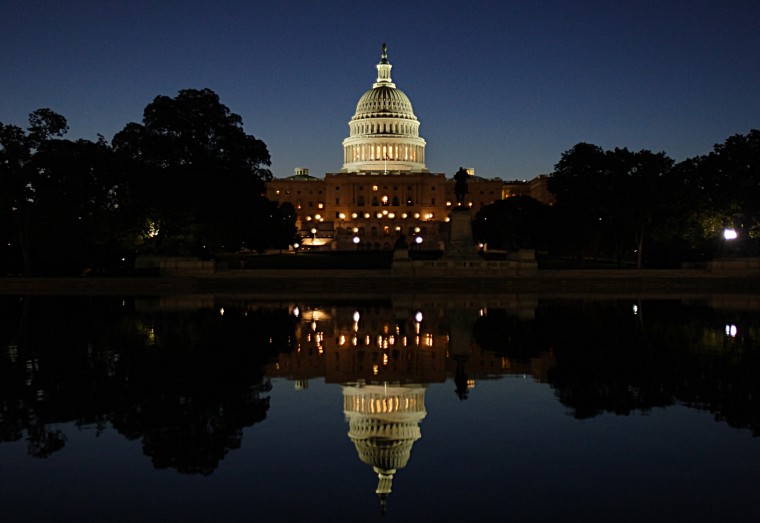Common sense suggests public appetite for action on guns is at its height immediately after deadly violence. With two high-profile mass shootings unfolding over the course of five days, one might assume that policymakers, aware of public polling, might feel added pressure to take at least modest steps to address the national scourge.
But those assumptions are always wrong. Always. No matter the circumstances, no matter the direction of the political will, no matter how mild and inoffensive the proposed remedies, congressional Republicans are simply an immovable object.
A
New York Times editorial today
summarized the latest developments in the Senate, following the murders in San Bernardino and Colorado Springs.
The evolving situation has forced Republican leaders and presidential candidates to contort themselves: talking tough on terrorism, yet ignoring the fact that the two were armed to the teeth with two .223-caliber assault rifles and two 9-millimeter semiautomatic pistols, and hundreds of rounds, all purchased legally. While the nation suffered through the shock of another bloody massacre, on Thursday every Senate Republican except Mark Kirk of Illinois voted against legislation to prevent people on the F.B.I.'s consolidated terrorist watchlist from purchasing guns or explosives.
Appreciating the specific proposal is important. As we
discussed last month, if someone is placed on the FBI's terrorist watchlist, and they go to an American airport to buy a plane ticket, someone behind the counter will say, "No." If that same person on the terrorist watchlist leaves the airport, drives to a gun show, and asks to stock up on assault rifles, someone behind the counter will likely say, "No problem."
So, Democratic officials have proposed a fix. Yesterday,
it failed, receiving only 45 votes. A total of 53 Republicans and one Democrat said the status quo should be left in place.
About a half-hour later, the Senate, for the first time in two years, took up the bipartisan Manchin-Toomey on expanding background checks. Despite its overwhelming popularity nationwide, it received
just 47 votes.
"If you need proof that Congress is a hostage to the gun lobby, look no further than today's vote," Sen. Dianne Feinstein (D-Calif.) said.
Politically, at face value, something doesn't add up. A few months ago, before a mass shooting in Oregon, Quinnipiac released national poll results on a variety issues, including guns. When respondents were asked, for example, "Do you support or oppose requiring background checks for all gun buyers?" it wasn't close: 93% of Americans support the idea.
As we
talked about at the time, while bipartisan consensus sometimes seems impossible, this is an issue where Democrats and Republicans are on the same page. According to the Quinnipiac results, 90% of GOP voters support mandatory background checks for all gun buyers, 92% of independents agree, as do 98% of Democrats.
Politicians want to get re-elected, which generally means taking steps voters like, and yet Republicans are convinced that they'll pay no price whatsoever for ignoring public will on curtailing gun violence.
And they're probably correct. The polls may be one-sided, but what they don't show is depth of commitment -- voters like the idea of new safeguards in the abstract, but come Election Day, they have a series of priorities, and issues like background checks fade into the background. Democrats have persuaded the American mainstream on the merit of their ideas, but the second half of the battle is more complicated: making the transition from passive agreement to genuine passion for constructive change.
"[W]e've got to change the politics of this. And that requires people to feel – not just feel deeply – because I get a lot of letters after this happens. 'Do something!' Well, okay, here's what you need to do. "You have to make sure that anybody who you are voting for is on the right side of this issue. And if they're not, even if they're great on other stuff, for a couple of election cycles you've got to vote against them, and let them know precisely why you're voting against them. And you just have to, for a while, be a single-issue voter because that's what is happening on the other side. "And that's going to take some time. I mean, the NRA has had a good start. They've been at this a long time, they've perfected what they do. You've got to give them credit – they're very effective, because they don't represent the majority of the American people but they know how to stir up fear; they know how to stir up their base; they know how to raise money; they know how to scare politicians; they know how to organize campaigns. And the American people are going to have to match them in their sense of urgency if we're actually going to stop this."
